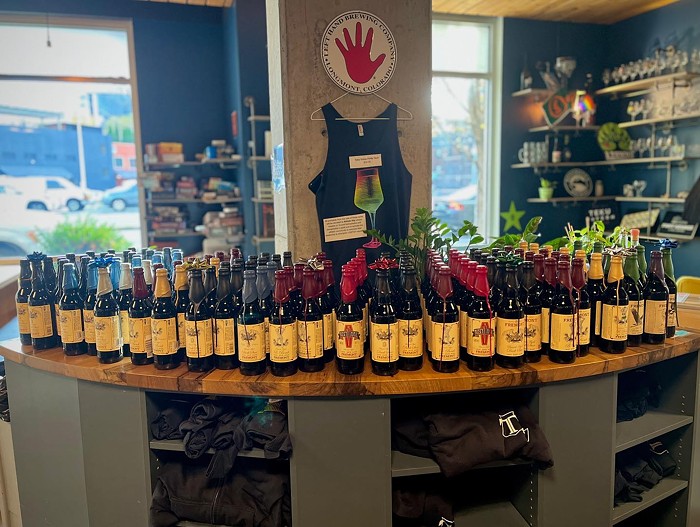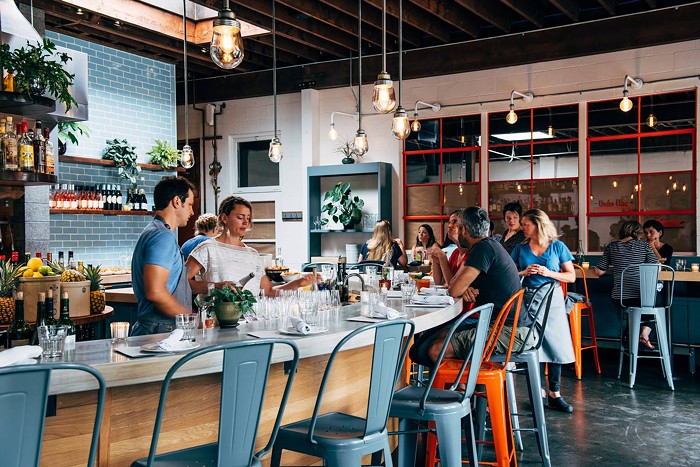The trouble with trustworthiness is that the slightest slip, the whitest lie, once found out, calls everything else into question. To be trustworthy, you have to be trustworthy all the time, or it isn't worth anything. Authenticity has the same problem. One inauthentic detail in an otherwise authentic façade calls the entire façade into question.
Salvatore Ristorante Italiano (the very name itself slaps you with its "authenticity" before you even enter—it could also have been called Sal's Italian Restaurant) sports a hand-painted mural of an Italian street scene (Italian flags are painted in, hanging from a few windows, just to make sure you get it), an incessant loop of Frank Sinatra's greatest hits on the sound system, and a large stone arch over the dining room. The walls are painted to resemble plaster falling off of brick, and there are framed sepia-toned photos of European-immigrant-looking couples hanging on the wall.
These might all be authentic details. There may indeed be a Salvatore, and the old photos may indeed be his grandparents. That arch overhead might really be made of stone. But when the waiter arrived at out table sporting a fake Italian accent (jokingly and only periodically), it grated, and called the authenticity of everything else about the experience, food included, into question. When he pitched the most expensive entrée as the best on the menu, and the second-most expensive as the second best, you wanted to believe him; you wanted to trust that great dishes are made from great ingredients, and that great ingredients cost more. But then you looked at the almost Disneyesque faux detailing in the room and it's tough to know what and whom to trust.
Not that recipes need to be authentic in order to taste good. And the food at Salvatore does taste good, even if it's uninspired. The antipasto plate was basic but solid—the cheeses and meats were just sharp enough to prep the palate—and it was more than enough for two people to share. The caprese was straightforward (if swimming in oil) but who doesn't love a straightforward caprese? My friend and I approximated that we could survive for at least a week eating only tomatoes, mozzarella, and basil with a little salt and pepper.
I'm not sure we could have survived as long on the rest of the meal. The Siciliano pizza (capers and olives) arrived at the table a bit soggy, and was overpowered by the salt from the capers. It was a single note, struck very hard. The veal scaloppine with asparagus was more interesting, involving a few more harmonizing notes (as with pork and apples, God must have thought up veal and asparagus in the same moment of creation). Everything was cooked perfectly, and perfectly proportioned on the plate. It was just fine. Uninspired and fine.
The tiramisu for dessert was similarly fine but uninspired. All of the ingredients were there, in the correct proportions, assembled in the correct order. And there wasn't an iota of passion or intent or personality on the plate.
On the night my friend and I dined, the restaurant's two-tops, lining the perimeter of the room, were nearly all full, while the four- and six-tops in the center of the room remained empty. Couples huddled over tables in dim lighting, seemingly murmuring comfortable things in each other's ears. It was, as we walked to our two-top by the wall, a perfect picture of intimate European dining. But as we sat and looked more closely, we noticed that there didn't seem to be any real intimacy happening at the other tables. Couples were looking around the room, or sitting in silence, or, in the case of the Asian couple by the window, taking pictures of one another. The "authentic" romantic façade worked at a glance, but didn't hold up to further inspection. Neither does Salvatore Ristorante Italiano. In the words of our American waiter as we passed on our way out the door, "Ciao guys!" ![]()


















